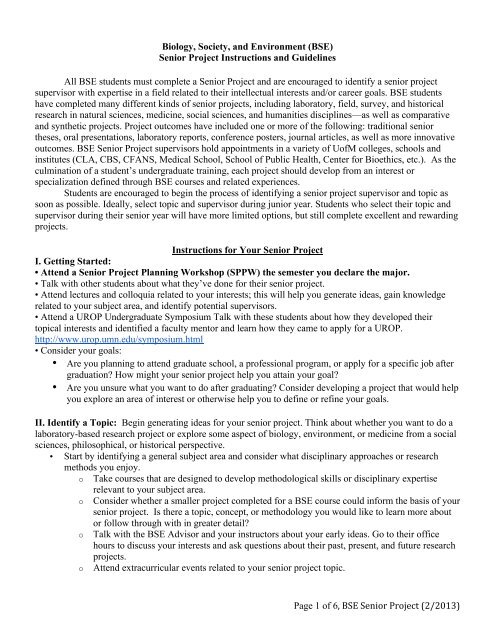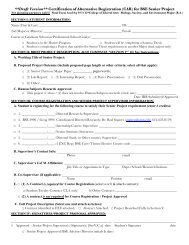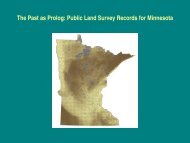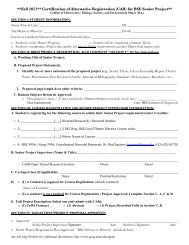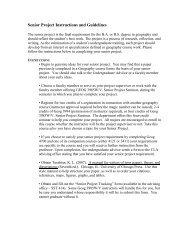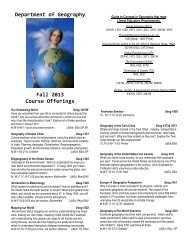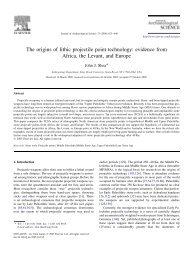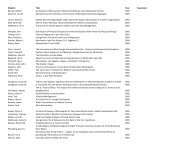BSE Senior Project Instructions & Guidelines - Department of ...
BSE Senior Project Instructions & Guidelines - Department of ...
BSE Senior Project Instructions & Guidelines - Department of ...
Create successful ePaper yourself
Turn your PDF publications into a flip-book with our unique Google optimized e-Paper software.
Biology, Society, and Environment (<strong>BSE</strong>)<br />
<strong>Senior</strong> <strong>Project</strong> <strong>Instructions</strong> and <strong>Guidelines</strong><br />
All <strong>BSE</strong> students must complete a <strong>Senior</strong> <strong>Project</strong> and are encouraged to identify a senior project<br />
supervisor with expertise in a field related to their intellectual interests and/or career goals. <strong>BSE</strong> students<br />
have completed many different kinds <strong>of</strong> senior projects, including laboratory, field, survey, and historical<br />
research in natural sciences, medicine, social sciences, and humanities disciplines—as well as comparative<br />
and synthetic projects. <strong>Project</strong> outcomes have included one or more <strong>of</strong> the following: traditional senior<br />
theses, oral presentations, laboratory reports, conference posters, journal articles, as well as more innovative<br />
outcomes. <strong>BSE</strong> <strong>Senior</strong> <strong>Project</strong> supervisors hold appointments in a variety <strong>of</strong> U<strong>of</strong>M colleges, schools and<br />
institutes (CLA, CBS, CFANS, Medical School, School <strong>of</strong> Public Health, Center for Bioethics, etc.). As the<br />
culmination <strong>of</strong> a student’s undergraduate training, each project should develop from an interest or<br />
specialization defined through <strong>BSE</strong> courses and related experiences.<br />
Students are encouraged to begin the process <strong>of</strong> identifying a senior project supervisor and topic as<br />
soon as possible. Ideally, select topic and supervisor during junior year. Students who select their topic and<br />
supervisor during their senior year will have more limited options, but still complete excellent and rewarding<br />
projects.<br />
<strong>Instructions</strong> for Your <strong>Senior</strong> <strong>Project</strong><br />
I. Getting Started:<br />
• Attend a <strong>Senior</strong> <strong>Project</strong> Planning Workshop (SPPW) the semester you declare the major.<br />
• Talk with other students about what they’ve done for their senior project.<br />
• Attend lectures and colloquia related to your interests; this will help you generate ideas, gain knowledge<br />
related to your subject area, and identify potential supervisors.<br />
• Attend a UROP Undergraduate Symposium Talk with these students about how they developed their<br />
topical interests and identified a faculty mentor and learn how they came to apply for a UROP.<br />
http://www.urop.umn.edu/symposium.html<br />
• Consider your goals:<br />
• Are you planning to attend graduate school, a pr<strong>of</strong>essional program, or apply for a specific job after<br />
graduation? How might your senior project help you attain your goal?<br />
• Are you unsure what you want to do after graduating? Consider developing a project that would help<br />
you explore an area <strong>of</strong> interest or otherwise help you to define or refine your goals.<br />
II. Identify a Topic: Begin generating ideas for your senior project. Think about whether you want to do a<br />
laboratory-based research project or explore some aspect <strong>of</strong> biology, environment, or medicine from a social<br />
sciences, philosophical, or historical perspective.<br />
• Start by identifying a general subject area and consider what disciplinary approaches or research<br />
methods you enjoy.<br />
o Take courses that are designed to develop methodological skills or disciplinary expertise<br />
relevant to your subject area.<br />
o Consider whether a smaller project completed for a <strong>BSE</strong> course could inform the basis <strong>of</strong> your<br />
senior project. Is there a topic, concept, or methodology you would like to learn more about<br />
or follow through with in greater detail?<br />
o Talk with the <strong>BSE</strong> Advisor and your instructors about your early ideas. Go to their <strong>of</strong>fice<br />
hours to discuss your interests and ask questions about their past, present, and future research<br />
projects.<br />
o Attend extracurricular events related to your senior project topic.<br />
Page 1 <strong>of</strong> 6, <strong>BSE</strong> <strong>Senior</strong> <strong>Project</strong> (2/2013)
o Volunteer, complete an internship, or work in a laboratory, community organization, or clinic<br />
related to your interests or career goals. Such experiences may form the basis for your senior<br />
project &/or a UROP.<br />
• Refine your Topic and Consider your Goals:<br />
o Come up with several potential topics within your subject area; this may help you identify<br />
potential supervisors who have topical or methodological expertise.<br />
o Apply for a UROP and develop your senior project out <strong>of</strong> that research.<br />
• If you have specific goals (e.g., applying for grad school, grant or fellowship) could the senior project<br />
help you to achieve them?<br />
III. Select a <strong>Senior</strong> <strong>Project</strong> Supervisor:<br />
Choose a supervisor whose intellectual interests or methodological approach are compatible with your goals.<br />
Your primary project supervisor must be a U<strong>of</strong>M employee holding a higher degree, though in some cases<br />
students work with multiple supervisors, including laboratory technicians, graduate students, or other persons<br />
with special expertise with whom you have developed a relationship. Think about relationships you have<br />
already established, or use resources to identify pr<strong>of</strong>essors that work in areas related to your topic.<br />
IV. Things to consider:<br />
Some faculty members will only supervise students with whom they have worked previously; if you would<br />
like to work with a specific person, make sure to take one to three courses with them prior to the semester<br />
you’ll be working on the senior project. In most cases, speak with potential supervisors as soon as you think<br />
you might want to work with them on a project. Go to their <strong>of</strong>fice hours and talk with them about your<br />
interests and seek advice early about what courses might prepare you to work with them.<br />
If your faculty mentor is teaching a compatible course the semester you would like to complete the<br />
project, this may be an excellent way to simultaneously complete two requirements (see 2 extra credit course<br />
option).<br />
Finding a lab position or a project supervisor may seem like a difficult task at first. The U<strong>of</strong>M has<br />
great resources to help you through this process.<br />
Use college websites (ie: CBS, CLA, CFANS) for information on pr<strong>of</strong>essors and opportunities within<br />
specific fields. The CBS website <strong>of</strong>fers a “Roadmap to Research” which is a useful tool while planning your<br />
senior project, regardless <strong>of</strong> whether it is research-based or not: http://www.cbs.umn.edu/students/roadmapresearch<br />
In addition to these resources, the U<strong>of</strong>M has developed resources such as the “Experts @ the U”<br />
website to help students identify faculty with similar interests: http://experts.umn.edu/default.asp<br />
V. Contacting a prospective supervisor:<br />
• If you have already met your potential supervisor, it is appropriate to go directly to <strong>of</strong>fice hours or<br />
send a brief, pr<strong>of</strong>essional email asking to meet with them in person.<br />
• If you are emailing the pr<strong>of</strong>essor as your first method <strong>of</strong> contact:<br />
o Spend some time drafting and editing the email.<br />
o Use this opportunity to express your interest.<br />
o Mention past learning experiences which give you knowledge on the topic.<br />
o Express that you have interest in their work and why they would be a great supervisor for<br />
such a project<br />
o Connect the work you would be doing in your project with work they have conducted.<br />
o Your first contact with a potential supervisor should be pr<strong>of</strong>essional and coherent.<br />
VII. Meeting with prospective supervisors:<br />
Page 2 <strong>of</strong> 6, <strong>BSE</strong> <strong>Senior</strong> <strong>Project</strong> (2/2013)
• Prepare for this process as you would for a job interview. Make sure to be pr<strong>of</strong>essional and prepared<br />
to discuss with your supervisor, and show your interest in the topic.<br />
• Do some homework ahead <strong>of</strong> time and read recent publications by your supervisor, even if you have<br />
already established a relationship with them through coursework or other experiences.<br />
• Make it clear that you are passionate and prepared, and ready to work with them on a project closely<br />
related to theirs or propose an exciting new project!<br />
• Always suggest a next step (eg: I can come to your <strong>of</strong>fice hours to meet or contact you via phone or<br />
email. What time is best for you?)<br />
• Use resources from the CLA Careers Center to help get you started and give you a general idea <strong>of</strong><br />
how to pr<strong>of</strong>essionally and respectfully contact your supervisor:<br />
http://www.clacareer.umn.edu/coverletter/<br />
• Emailing prospective supervisors: The CLA career center has handouts on emailing prospective<br />
employers. [[Find a link and create 2 sentences talking about pr<strong>of</strong>essionalism and timeliness.]]<br />
VIII. Develop a Timeline for your <strong>Senior</strong> <strong>Project</strong> based on your goals: Careful planning and<br />
consideration <strong>of</strong> your options is strongly recommended. Due to the wide variety <strong>of</strong> possible <strong>BSE</strong> senior<br />
projects, it is important to contact your supervisor early and ensure that you can make a project that is both<br />
appropriate for your discipline and fits the <strong>BSE</strong> major.<br />
• Students are encouraged to begin the process <strong>of</strong> identifying a senior project supervisor and topic as<br />
soon as possible.<br />
• Students who identify a supervisor early may be able to apply for a UROP that would fund their<br />
research. The UROP project could be the basis <strong>of</strong> the senior project. (UROP recipients still need to<br />
register for senior project credits.)<br />
• Contact the potential senior project supervisor at least one semester prior to when you plan to begin<br />
working on the project (including course instructors for 2xcr registration option).<br />
• Students who begin work on their senior project prior to their final semester may be able to use the<br />
research experience or the product <strong>of</strong> their project for an application to grad school, pr<strong>of</strong>essional<br />
programs, internships, jobs, or grants.<br />
• Some students have published peer reviewed articles, presented their work at pr<strong>of</strong>essional meetings,<br />
or applied for grants and fellowships based on their senior projects. The chance that you might too is<br />
increased when your work is well planned and there remains time to refine the work with the help <strong>of</strong><br />
the faculty mentor after completing the actual senior project.<br />
• Some students plan (and complete) their senior project during their final semester. Their options are<br />
more limited.<br />
IX. Course Registration Options:<br />
There are multiple registration options that satisfy the credit/course requirement for the senior project.<br />
Whether you register for the senior project course during the regular registration period or during the first<br />
few weeks <strong>of</strong> the semester varies. See below for details.<br />
• Students must register A/F (and earn C- or better), unless completing Directed study in CBS and S/N<br />
is the only registration option for the course (i.e., Directed Study courses <strong>of</strong>fered by CBS are only<br />
<strong>of</strong>fered S/N).<br />
• Students must complete a minimum <strong>of</strong> 3 credits in an approved <strong>Senior</strong> <strong>Project</strong> course option with the<br />
following exceptions:<br />
o Students may register for 2 credits in a Directed Study course and concurrently enroll in an<br />
approved <strong>BSE</strong> Core/Theme Elective course <strong>of</strong>fered by a CLA department to fullfill the senior<br />
project requirement.<br />
o Students may register for two 2cr Directed Studies courses if their research plan requires<br />
multiple semesters <strong>of</strong> work (pre-approval required).<br />
Page 3 <strong>of</strong> 6, <strong>BSE</strong> <strong>Senior</strong> <strong>Project</strong> (2/2013)
o Students who enroll in PHIL 3993 to complete a “stand alone” project with Philosophy<br />
Faculty may register for 2 credits to complete the <strong>BSE</strong> <strong>Senior</strong> <strong>Project</strong> course requirement.<br />
• Students should contact the <strong>BSE</strong> Advisor prior to registration to verify that their proposed project and<br />
registration plan meet the <strong>BSE</strong> <strong>Senior</strong> <strong>Project</strong> requirement.<br />
Registration Options:<br />
1. Directed Research in CLA<br />
2. Directed Research in CBS<br />
3. Directed Research outside CLA/CBS<br />
4. Major Paper Courses and <strong>Senior</strong> Seminars<br />
5. Coordinated Directed Research (Registration in <strong>BSE</strong> 3996 coordinated by Dr. Squires while<br />
working with select non-CLA faculty supervisors)<br />
6. 2 Extra Credit Registration in a Directed Research course while concurrently enrolled in a<br />
<strong>BSE</strong> core or theme elective course (CLA)<br />
1) Directed Research in College <strong>of</strong> Liberal Arts: Students should register for three (3) or more credits in a<br />
Directed Research course (e.g., ANTH 4994W, GEOG 3996, etc.) by completing a CLA Student-Faculty<br />
Contract. The SP Supervisor, the student, and the department’s Undergraduate Advisor should each sign the<br />
SFC. Students then submit the SFC to CLA Student Services (49 Johnston) to obtain a permission number to<br />
register for the appropriate class. Student must submit a legible copy to the <strong>BSE</strong> advisor within one week <strong>of</strong><br />
registration.<br />
CLA Student-Faculty Contract http://www.clacareer.umn.edu/directedstudy/research.html<br />
2) Directed Research in College <strong>of</strong> Biological Sciences: Students should register for three (3) or more<br />
credits in a Directed Research course (EEB/GCD/BIOL 4794W or 4994, etc.) by completing the CBS<br />
Directed Research Contract. The SP Supervisor forwards the electronic copy <strong>of</strong> the contract to appropriate<br />
Director <strong>of</strong> Undergraduate Studies (see DRC instructions). Student must submit a legible copy to the <strong>BSE</strong><br />
advisor within one week <strong>of</strong> registration.<br />
CBS Directed Research Contract: http://www.cbs.umn.edu/students/directed-research<br />
CBS DRC Deadline: Approved contract must be received by CBS Student Services by 10th day <strong>of</strong> semester.<br />
3) Directed Research outside <strong>of</strong> CLA/CBS: Students may register for three (3) or more credits in an upperdivision<br />
Directed Research, Directed Studies, or Independent Study course in accordance with the<br />
procedures <strong>of</strong> a given U<strong>of</strong>M department or institute (FR, ESPM, BTHX, PUBH). Complete any forms<br />
required for course registration and register for the course. Student must submit a legible copy <strong>of</strong> all required<br />
forms and a CAR Form signed by the senior project supervisor to the <strong>BSE</strong> advisor within one week <strong>of</strong><br />
registration.<br />
• Student must register A/F.<br />
• Students should register for a 3xxx or 4xxx level course when available.<br />
• Registration in an 8xxx level course is not allowed.<br />
• When no appropriate course option is available (Academic Health Services, Medical School, etc.),<br />
see “Co-ordinated Registration for Directed Research” (below).<br />
4) Major Paper Courses and <strong>Senior</strong> Seminars: Students who have completed 2 or more courses in a<br />
discipline may wish to request permission to take a <strong>Senior</strong> <strong>Project</strong> Seminar or Major Paper course <strong>of</strong>fered by<br />
a department (especially if that course is being taught by a desired supervisor).<br />
• The History <strong>of</strong> Medicine <strong>Department</strong> regularly <strong>of</strong>fers a <strong>Senior</strong> <strong>Project</strong> Seminar designed for <strong>BSE</strong><br />
students (HMED 4960). Contact instructor/department for details.<br />
Page 4 <strong>of</strong> 6, <strong>BSE</strong> <strong>Senior</strong> <strong>Project</strong> (2/2013)
5) Co-ordinated Registration for Directed Research: The Director <strong>of</strong> Undergraduate Studies for <strong>BSE</strong>, Dr.<br />
Rod Squires, serves as a coordinator for the SP research experience when there is no obvious registration<br />
option available due to a supervisor’s affiliation (Medical School, School <strong>of</strong> Public Health, Centre for<br />
Population Studies, etc.). The Supervisor is responsible for all aspects <strong>of</strong> mentorship, supervision, and<br />
evaluation <strong>of</strong> the student.<br />
a) Student and SP Supervisor complete a CAR Form (supervisor should sign this form) and describe the<br />
project in detail in the body <strong>of</strong> the CLA Student-Faculty Contract (Supervisor DOES NOT sign the SFC!)<br />
b) Coordinator (Dr. Rod Squires) and <strong>BSE</strong> Advisor sign SFC and student submits it to CLA Student Services<br />
(49 Johnston) to obtain a permission number to register for <strong>BSE</strong> 3996.<br />
c) When the project has been completed, the Supervisor contacts the Coordinator, who submits the final<br />
grade for the course.<br />
6) 2 Extra Credit Registration in <strong>BSE</strong> Core or Theme Elective course: Concurrent 2 credit registration<br />
with a <strong>BSE</strong> Core/Theme elective course <strong>of</strong>fered by a CLA department. The senior project must be<br />
incorporated into the course structure and include a separate requirement for the student to complete, such as<br />
a senior thesis.<br />
Once the SP Supervisor and student have met to discuss the details <strong>of</strong> the senior project, they describe the<br />
project in the body <strong>of</strong> the CLA Student-Faculty Contract and complete a CAR Form. The student should<br />
register for two (2) credits <strong>of</strong> directed study in the CLA department <strong>of</strong>fering the “parent” course (<strong>BSE</strong> Core<br />
or Theme Elective). The student submits the SFC to CLA student services (49 Johnston) to obtain a<br />
permission number so that they can register for the directed research/study course. Student must submit a<br />
legible copy <strong>of</strong> the SFC and a CAR Form signed by the senior project supervisor (parent course instructor) to<br />
the <strong>BSE</strong> advisor within one week <strong>of</strong> registering for the directed research course.<br />
OTHER IMPORTANT INFORMATION:<br />
• Obtain Turabian, K. L. (2007). A manual for writers <strong>of</strong> term papers, theses, and dissertations (Seventh<br />
ed.). Chicago, IL: University <strong>of</strong> Chicago Press. Use this style manual to help structure your paper, as well<br />
as to order your citations, references, maps, figures, graphs, and tables.<br />
• Obtain and fill out the required forms for your project. These forms must be completed and a copy must be<br />
given to the <strong>BSE</strong> advisor to complete the senior project and to graduate.<br />
• It is not required, but is recommended, that you submit a final manuscript with the <strong>Senior</strong> <strong>Project</strong> forms to<br />
the <strong>BSE</strong> Advisor. A final manuscript is one that is complete and final, ready for submission as your <strong>Senior</strong><br />
<strong>Project</strong>. Turning in a manuscript means that your thesis will be archived within the department and make it<br />
available for other students to refer to when planning their own senior project. In addition to this, you can<br />
submit your senior project to win the Brown Day Best <strong>Senior</strong> <strong>Project</strong> within the Geography department.<br />
8 QUESTIONS YOU SHOULD ASK YOUR PROJECT ADVISOR<br />
1. What is the process through which I choose and refine the topic <strong>of</strong> my project?<br />
2. Do you expect my project to be “scholarly” and can you explain to me what that means to you?<br />
3. How frequently will we meet (or email) to discuss the project on my project?<br />
4. How many hours per week do you think I will need to put into my project?<br />
5. Will there be “milestones” with due dates assigned over the course <strong>of</strong> the semester (e.g. topic<br />
statement, annotated bibliography, rough drafts, etc.)? Are these negotiable? What are the<br />
consequences if I fail to meet a milestone?<br />
6. What are the minimum and maximum acceptable amounts <strong>of</strong> data and references for my project?<br />
How many pages do you expect my project to be, and does that include tables, figures, maps, and<br />
bibliography?<br />
7. What is the due date for project?<br />
8. What criteria do you use to assess my work and assign a final grade?<br />
Page 5 <strong>of</strong> 6, <strong>BSE</strong> <strong>Senior</strong> <strong>Project</strong> (2/2013)
Abstract or Manuscript submission requirements:<br />
Students should submit an abstract <strong>of</strong> their senior project. Students have the option to submit a full<br />
manuscript <strong>of</strong> a senior thesis.<br />
Recommended Manuscript Formatting Requirements:<br />
Ask your supervisor if they have specific formatting requirements. If your supervisor does not have a<br />
preference, follow the <strong>BSE</strong> manuscript formatting requirements:<br />
o<br />
o<br />
o<br />
o<br />
o<br />
o<br />
Select and adhere to a style guide (MLA, APA, Chicago, etc.).<br />
Margins: at least 1” on all sides<br />
Type size: 11 or 12 pt. font<br />
Font: Use easily readable fonts such as Times New Roman, Palatino, Schoolbook, or<br />
Bookman. Do not use Courier, Helvetica, Script, or their equivalents, as they are not designed<br />
for manuscript reading.<br />
Spacing: Use 1.5 or double spacing format for all main text<br />
Sections:<br />
§ Title Page<br />
§ Acknowledgements (optional)<br />
§ Abstract or Summary<br />
§ Table <strong>of</strong> Contents<br />
§ Body <strong>of</strong> the Thesis<br />
§ Appendices (optional)<br />
§ Bibliography or Works Cited<br />
Title Page formatting requirements<br />
Your title page for the FINAL MANUSCRIPT must mimic the following example:<br />
TITLE [capital letters]<br />
A <strong>Senior</strong> <strong>Project</strong> submitted to the Faculty <strong>of</strong> the Biology Society and Environment Program,<br />
University <strong>of</strong> Minnesota, in partial fulfillment <strong>of</strong> the requirements for the [Bachelor <strong>of</strong> Arts or the<br />
Bachelor <strong>of</strong> Science]<br />
Your Name [first, middle initial, last]<br />
Date [day, month, year--e.g., 1 December 2013]<br />
Honors students: See the online Honors Thesis Guide for additional information on formatting and Honorsspecific<br />
requirements. http://honors.umn.edu/latin-honors/thesis-guide/<br />
Also contact Jeanette Simmonds, Undergraduate Advisor for <strong>BSE</strong>: Email: geogadv@umn.edu<br />
Page 6 <strong>of</strong> 6, <strong>BSE</strong> <strong>Senior</strong> <strong>Project</strong> (2/2013)


